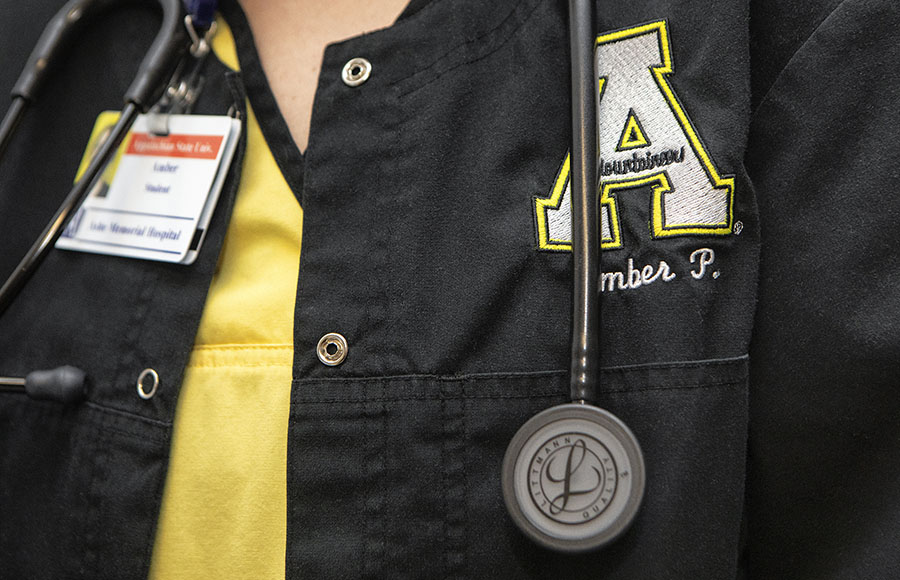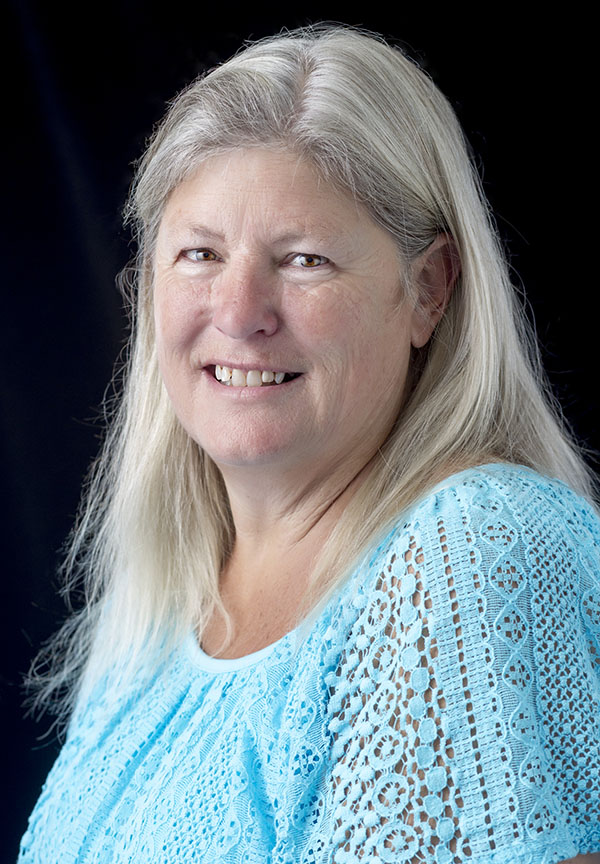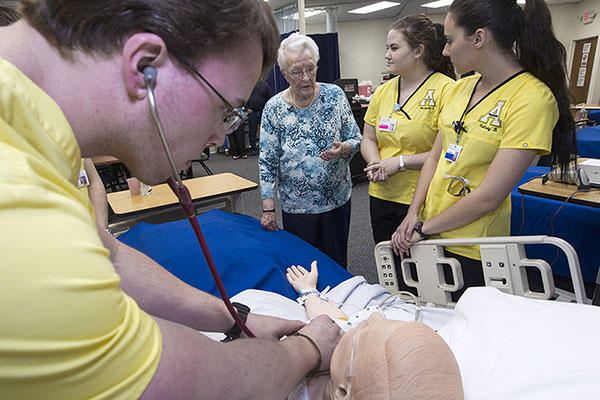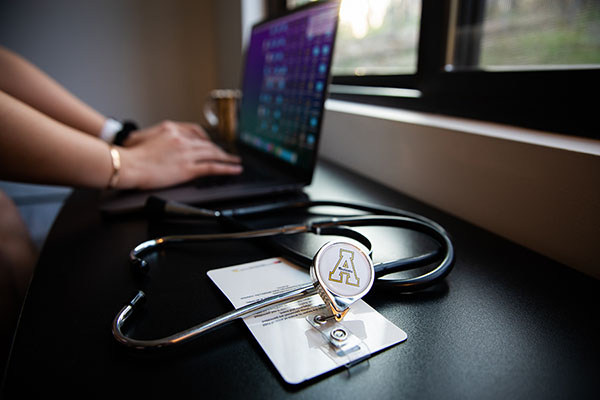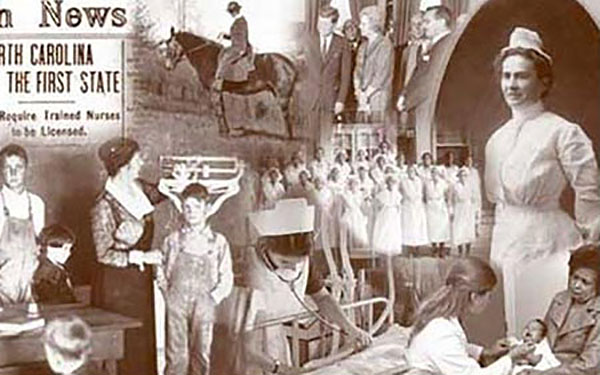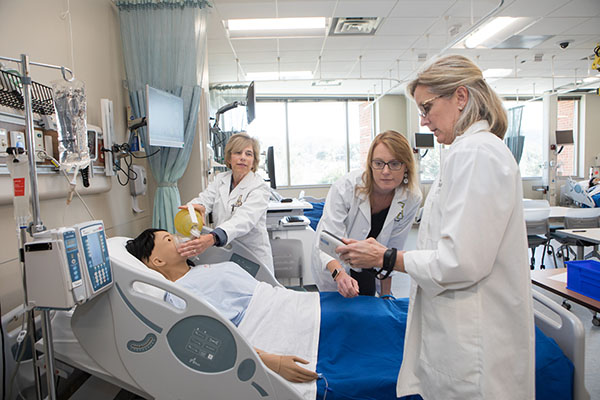Editor's Note: Dr. Phoebe Pollitt retired as an associate professor of nursing at Appalachian State University in 2019. As a nurse, an educator and a historian of nursing, she has spent her career studying and celebrating the accomplishments of nurses past and present. The following article was published in Our State magazine’s May 2021 issue. It is a tribute to nursing heroes everywhere and republished here courtesy of Our State.
By Phoebe Pollitt
Nurses are all around us: in hospitals, clinics, psychiatric facilities, prisons, schools, hospice centers, and people’s homes. They’re in executive suites, research laboratories, and the halls of government. Yet they tend to be all but invisible.
As a student at the University of North Carolina at Chapel Hill in the mid-1970s, I worked in the North Carolina Room of Wilson Library. I was the “clippings girl,” and my daily assignment was to read the major newspapers in the state and cut out items of interest to future scholars. Occasionally, I’d clip articles about the nursing profession. I knew I wanted to be a nurse, but the job also sparked an interest in history, and those stories began my lifelong passion for North Carolina nursing history.
The untrained nurse is as old as the human race; the educated nurse is a relatively recent phenomenon. Today’s Tar Heel nurses stand on the shoulders of the pioneers who founded the profession. During the Civil War, brave women defied social norms by leaving their homes and caring for people who were not part of their families. They acted on the human impulse to care for others who were sick and injured in Confederate, Union, and wayside hospitals throughout our state. By the turn of the 20th century, nurses had created the first female professional organization in the state, the North Carolina State Nurses Association; successfully lobbied the General Assembly to pass the first nurse registration law in the country; and founded clinics, hospitals, and schools of nursing. Nurses like Jane Wilkes, Mary Wyche, Lydia Holman, and Charlotte Rhone inspired the generations that followed to go beyond their normal routines to improve the health and well-being of all people.
All of nursing is focused on caring for others to make the world a better place.
By the time I was a student in the ’70s, there was a lot of excitement about the beginnings of rural health clinics — largely staffed by nurse practitioners, a new role that was being created in schools of nursing and in the legislature. Other career paths were opening up in jails, schools, and more. Upon graduation, nurses once recited the Florence Nightingale Pledge, to “aid the physician in his work,” but today, nurse practitioners, nurse midwives, and nurse anesthetists work independently in many health-care settings.
I began my own career in a crisp white uniform and starched cap, and I adapted, along with most nurses, to scrubs and lab coats. I started working in a hospital, but I soon moved into public health, school health, and my career as a nurse educator.
Before that job at Wilson Library, I had thought of nursing in terms of one nurse caring for one patient. But as I learned more about nursing as a career, stories about historically significant nurses opened my eyes to nursing in a larger context: nurses as social change agents, as builders and founders, as pioneers.
I realized, for the first time, that the nursing profession and nurses could expand beyond helping individuals to helping improve the well-being of communities, our state, and even our nation. All of nursing is focused on caring for others using all that we have — heads, hands, and hearts — to make the world a better place.
What do you think?
Share your feedback on this story.
Generations of Appalachian students received care from this founding member of the Student Health Association of North Carolina. The university's M.S. Shook Health Service is named for her.
About the Department of Nursing
The Department of Nursing in Appalachian State University’s Beaver College of Health Sciences provides an evidence-based nursing education in an intellectually stimulating and challenging environment that is designed to prepare the beginning nursing professional with the knowledge and skills to practice in diverse settings in a highly complex health care system. The department offers two accredited Bachelor of Science programs: the nursing pre-licensure program and the online RN to BSN program, designed for current registered nurses seeking the bachelor’s degree. The department also offers a Master of Science in nursing program that prepares registered nurses for leadership roles as educators. Learn more at https://nursing.appstate.edu.
About the Beaver College of Health Sciences
Appalachian State University’s Beaver College of Health Sciences (BCHS), opened in 2010, is transforming the health and quality of life for the communities it serves through interprofessional collaboration and innovation in teaching, scholarship, service and clinical outreach. The college enrolls more than 3,600 students and offers 10 undergraduate degree programs, nine graduate degree programs and four certificates across seven departments: Kinesiology, Nursing, Nutrition and Health Care Management, Public Health, Recreation Management and Physical Education, Rehabilitation Sciences, and Social Work. The college’s academic programs are located in the Holmes Convocation Center on App State’s main campus and the Levine Hall of Health Sciences, a state-of-the-art, 203,000-square-foot facility that is the cornerstone of Boone’s Wellness District. In addition, the college supports the Appalachian Institute for Health and Wellness and has collaborative partnerships with the Wake Forest University School of Medicine’s Physician Assistant Program, UNC Health Appalachian and numerous other health agencies. Learn more at https://healthsciences.appstate.edu.
About Appalachian State University
As a premier public institution, Appalachian State University prepares students to lead purposeful lives. App State is one of 17 campuses in the University of North Carolina System, with a national reputation for innovative teaching and opening access to a high-quality, cost-effective education. The university enrolls more than 21,000 students, has a low student-to-faculty ratio and offers more than 150 undergraduate and 80 graduate majors at its Boone and Hickory campuses and through App State Online. Learn more at https://www.appstate.edu.
